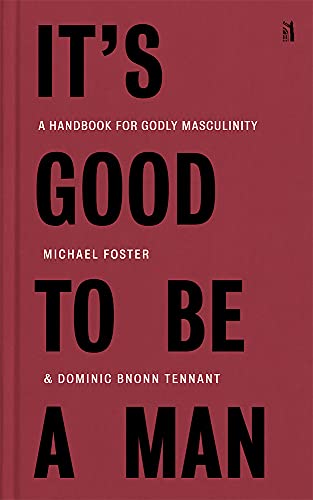It’s Good to Be a Man is sweeping through Reformed Christian circles, being used to disciple young men. However, before we throw this book into the hands of our young people, it’s imperative we take a critical look at the ideas from the book.
When I sat down to read this book by Michael Foster and Dominic Bnonn Tennant, I knew it was a polarizing book, receiving both strong acclaim and heavy criticism. In a culture awash in gender-flattening feminist and “woke” ideals, It’s Good to Be a Man offers something different: a sweeping Christian vision of what makes a man a man.
And yet…

Whatever cultural malaise the authors have put their finger on, I have grave doubts their book points to the cure.
Already I can hear the sounds of reformed, orthodox Christian readers closing their browser windows, wondering whether I just might be a raging egalitarian or closet feminist. I can assure you, I am not.
- I affirm God made us male and female, that men and women are not androgynous and never should be.
- I affirm husbands are called to self-sacrificial leadership of their wives, that wives are called to voluntary submission to their husbands.
- I affirm that ordination is restricted to qualified men.
But the authors of It’s Good to Be a Man make many claims that are both incorrect and concerning.
A Summary of “Masculine Virtues” in It’s Good to Be a Man
It’s Good to Be a Man is all about highlighting and celebrating the unique qualities of masculinity to help each male reading the book to become “good at being a man” (205, all page numbers are from the Kindle version).
The entire premise of the book is centered around their identified uniquely masculine virtues, “virtues that Scripture suggests as integral to manhood” (158). Foster and Tennant state, “There is a triad of masculine virtues that we can derive directly from Scripture. These are unique ways in which men are to be holy” (144). These masculine virtues are wisdom, workmanship, and strength.
But, the reader asks, shouldn’t women display these virtues as well? Foster and Tennant anticipate this question for each virtue.
Wisdom
“Though both men and women ought to seek wisdom, women are instructed to seek it from men: from their husbands (1 Cor. 14:35; cf. Eph. 5:26) and from their pastors—who are in turn selected out of the men in the Church for their special skill at their husbandly duties (1 Tim. 3:1–7). This makes being wise an especially masculine obligation” (145, emphasis mine).
Workmanship
“Again, women can be known for workmanship, and they should seek to develop it. They worship through service also. But workmanship is about more than simply doing; it is about becoming useful. This is a uniquely masculine quality. To see this, simply consider the difference between what women look for in a man and what men look for in a woman. At a simplistic level, women see men as success objects; men see women as sex objects. Men look for external and internal beauty; women look for active and potential utility. Our desires for the opposite sex reflect the baseline purpose of that sex, the foundational design, the way in which they fulfill their duties of dominion—and utility is what workmanship is all about. This is why it is integral to masculinity in a way that it is not to femininity” (146, emphasis mine).
Strength
“Strength is the fortitude through which you stand firm under pressure, through which you translate the virtue of wisdom into action. It is the firmness of asserting rather than retiring, the hardness of conquering rather than surrendering, the force by which we do and dare. Strength penetrates and divides, overcomes and shapes, prevails and subdues. A woman who is strong like this is butch and unnatural; a man who is not is gay—and equally unnatural” (147, emphasis mine).
(If you skipped or only skimmed those quotes, go back to read them carefully.)
These three virtues provide the latticework for the rest of the book’s advice to men about cultivating godliness in a uniquely masculine way.
Theological Foundation of It’s Good to Be a Man
What undergirds Foster and Tennant’s advice to men is their strong theological convictions about the nature of manhood.
The book separates maleness and femaleness into two distinct ontological natures. (“Ontological” is a fancy word for the nature of being, or what something really is).
The authors repeatedly use phrases like “masculine nature” (12, 26, 85, 101, 108) and “Adam’s nature” (23). This distinct nature, the authors claim, is fundamental to who men are—even down to our very souls—claiming that when we die and our spirits go to be with the Lord, “we will not become genderless.” Instead, we will be “as men without bodies.” Men have male souls. Women have female souls. And for men, “On the last day, we shall receive glorified and immortal bodies: male bodies that perfectly match and reflect and complete our male spirits—and vice versa” (99).
But what exactly is a “masculine” nature? What does this entail?
For Foster and Tennant, the chief scriptural foundation for the existence of a unique masculine nature is the first chapters of Genesis:
“Genesis contains the blueprint for recovering manhood. It contains the key to explaining our present cultural moment. It contains the information you need to understand women. It contains the clues necessary to interpret God’s direction for your life. It contains the landmarks you need to find your way to mature manhood. Everything is in Genesis” (17)
The authors go into great detail about the mandate God gave to human beings in the beginning (Genesis 1:26-28), but for Foster and Tennant, the whole book spins on the term “dominion“—a term they use nearly 90 times in 14 short chapters.
God specifically creates human beings for this purpose—”have dominion over the fish of the sea and over the birds of the heavens and over the livestock and over all the earth and over every creeping thing that creeps on the earth” (Genesis 1:26)—but in It’s Good to Be a Man, repeatedly, the emphasis is placed on Adam’s leadership in this commission.
While both Adam and Eve were created in the image of God, each images God in a specifically intended manner. What this means to the authors is, “Adam can subdue but not fill; Eve can fill but struggles to subdue. Together, they supply what the other lacks and perfect the other’s natural virtues, duties, and abilities, to bring right order to every sphere of life” (218).
Since God expects men to take leadership of the dominion mandate, Foster and Tennant insist, “God made men for dominion” (introduction, emphasis mine). Dominion “is part of our very nature” as men (169). As image-bearers, we are to look at how God glories in “exercising His might and subduing His enemies by force.” When we do this, it “calibrates our understanding of…Adam’s nature” and reminds men of the goodness of a man’s “aggressive instincts” (22-24).
In other words, for Foster and Tennant, “dominion” is a masculine term. The call to “man up” is a call to exercise dominion (164). The “trade of dominion” is the “trade of wise rulership,” passed down from father to son (133). The very things that compel men to exercise dominion are the “masculine desires” God has given us.
Foster and Tennant, therefore, draw heavily on their own understanding of sociology and the psychologies of men and women so that they can extrapolate from those more details about this “masculine nature” and “feminine nature.”
- Why are so many societies patriarchal? Because “they all are derived from the original, prototypical household.” Indeed they claim, “Patriarchy is inevitable. God has built it into the fabric of the cosmos. It is part of the divine created order. It is natural and irrevocable” (2).
- Both men and women need close friendships, but women’s friendships tend to be “united around shared emotion,” whereas men need a close group “united around a shared mission” (193-194).
- Women tend to bond around “a process of inclusion,” complimenting each other even when they don’t mean it. Men tend to bond by “a process of exclusion,” showing affection through insults they don’t mean (199-200).
- Women are designed “to fill the inward world, building a community,” thus placing a premium on social harmony. Men are designed to test and ensure their place in a group by competing within it (200).
All these observations flower into portraits of what they call godly masculinity and femininity:
“The man is the house-builder; the woman the home-maker. She takes that house and she appoints it and furnishes it until it becomes a home: a place of rest and comfort and hospitality. The man is the supplier; the woman the refiner. She takes the raw materials that he provides through the sweat of his brow—whether food, or cloth, or money, or whatever else—and returns them as a good meal, a fine garment, a beautified home, or some other resource of greater value. This is most exemplified in child-bearing itself, where she takes her man’s seed into her, and returns it to him as an offspring and an inheritance” (208-209).
It’s Good to Be a Man: A Word of Warning
It’s Good to Be a Man is filled with catchy one-liners and punchy statements about the value of discipleship in the church, about being men of vision, planning, enterprise, and constancy, about becoming men who are driven by desires to glorify God, love their neighbors, and provide for those under their care.
Amen to all of these things.
But sadly, for all the book’s grow-up-and-take-responsibility-for-yourself truisms, Foster and Tennant paint a bleak picture of masculinity and femininity—and worse yet, they fail to sufficiently ground their ideas in Scripture.
The Book Marginalizes Women
While it is true that characteristically masculine traits are becoming unjustly pathologized in today’s culture, the answer isn’t writing a treatise that effectively marginalizes women.
The authors are pretty clear in this regard. They believe it is the nature of women…
- to influence others into “mystical emotional chaos” (92),
- to have social instincts that are “inversely proportional to ensuring orthodoxy” (91),
- to approve and endorse “flatterers, hirelings, soft men” and to disapprove and ostracize “truth-tellers, shepherds, tough men” (91),
- to lead people in the opposite direction of pleasing God (92),
- to avoid “masculine strategies like direct confrontation and factual refutation” (93),
- and to give disingenuous compliments (200).
- Because of this, “Undue feminine influence thus leads to a spiritual disease” (91).
These degrading comments are given without any support.
Even their triad of masculine virtues—something that serves as the very structure of the book—reduces the dignity and value of women.
- The book states, “Though both men and women ought to seek wisdom, women are instructed to seek it from men” (145). This entirely misses the many instances in Scripture where women are the channel through which men learn wisdom (Judges 4:4-5; 2 Kings 22:14; Proverbs 31:1; Acts 18:24; 2 Timothy 1:5), and that wisdom itself is personified as a woman in Proverbs 8-9.
- The book states that a “useful” sort of workmanship is a “uniquely masculine quality.” Foster and Tennant believe, “At a simplistic level, women see men as success objects; men see women as sex objects,” and for them, this observation reflects the “baseline purpose” of women: her beauty to attract a man and her reproductive abilities (146). This comment overlooks the scores of godly women in Scripture who were “useful” in ways beyond their sex appeal.
- The book states women aren’t meant to show strength by being firm under pressure or being assertive: “A woman who is strong like this is butch and unnatural; a man who is not is gay—and equally unnatural” (147). With this sort of criteria for femininity, we can label women like Shiphrah, Puah, Rehab, Achsah, Deborah, Jael, Ruth, Hannah, Abigail, the Beloved in Song of Solomon, and Esther as “butch and unnatural.”
The Book Attempts to Sanctify Secular Masculinity
Repeatedly, the book calls to mind common generalizations of men and attempts to cast them in a positive light.
- It reinforces a man’s desire for superficial qualities in a woman: “the sway of a woman’s hips… the shape and size of a woman’s breasts…what is smooth, what is tight, what is beautiful” (32-33), claiming these desires point to the true purpose of womanhood: sexual attraction and bearing children. None of this is balanced with godly wisdom that “Charm is deceitful, and beauty is vain, but a woman who fears the Lord is to be praised” (Proverbs 31:30)
- It calls men’s aggressive instincts good with little attention given to the widespread abuses of male strength (24).
- It gives a frightening picture of an ideal father as one whose physical presence “compels submission and brings order,” a man who is “bigger still and more distant,” a man with “fearful power to impose order upon us” (108). None of this is balanced with the image of a loving father who exhorts and encourages his children (1 Thessalonians 2:12).
In their zeal to present the creational goodness of “manly” drives, they paint a cartoonish picture of masculinity and miss the need for self-assertive manhood to be pruned to look more like Christ — selflessness, servant-hearted, and humility.
This sort of rhetoric is not only false but it’s the very sort of thing that feeds ungodly patriarchy.
The Book Binds the Consciences of Its Readers
It’s Good to Be a Man also presents certain Pharisaical dangers.
- They liken wearing yoga pants to “harlotry” (78).
- They demand all women to not draw any attention to themselves in church by speaking in any manner (80).
- They see motherhood as “foundational” to femininity—thus leaving single and barren women in the dust (12).
- They say all women are designed “to fill the inward world” (200) and be “the homemaker” (208).
All of these comments are made without qualification, and they unnecessarily bind the consciences of women.
As far as women being “homemakers,” Foster and Tennant fail to speak with any nuance. Jake Meador, editor-in-chief of Mere Orthodoxy, is correct when he says the separation of home and work is a relatively modern invention, and the church needs to help men and women understand this reality, not relegate homemaking to women alone.
On their website, Foster and Tennant take these conscience-binding opinions even further, saying those who are comfortable with women being presidents, firemen, policemen, and even soldiers have completely missed the telos (the goal or aim) for which women were created. In fact, according to the authors, if any preacher or teacher fails to call out these practices as abominations, they are disqualified from teaching the Bible at all.
The Book Misreads Genesis
As I indicated above, dominion is a driving idea in the book. The term is used twice in the book of Genesis, both times in chapter 1 when God creates male and female (Genesis 1:26,28): both are commanded to have dominion over the creatures of the world.
But for Foster and Tennant, dominion is a calling to men specifically.
This is clear at the outset of the book when they state, “History begins with a man, Adam, commissioned to be fruitful and to multiply and to rule over the earth in God’s stead” (2, emphasis mine). Never mind that these words about being fruitful and multiplying were spoken to both Adam and Eve (Genesis 1:28)—for Foster and Tennant, Adam takes center stage.
(Curiously, when the authors do quote the Genesis text in full on page 18, they use the ESV translation, which does not opt for the translation “dominion” but rather “rule.” Why didn’t they choose the KJV or the NKJV which uses “dominion”? Since they use these translations throughout the book, and since “dominion” is one of the primary lessons of the book, it’s hard not to assume that the translation selection is intentional. Had they used a translation that used the word “dominion” it would have undercut the claim they were trying to make: that dominion is a calling God gave to men.)
Conclusion: Look Elsewhere
It’s Good to Be a Man is a fitting title for this book because everywhere throughout the book the reader is left with the sad impression that it is not good to be a woman.
While there may be solid bits of advice throughout the book to pass along to your son, whatever benefit this book may provide, it comes with a healthy dose of poison that should be avoided.
Update (2/15/23)
Co-author Michael Foster reached out to comment on this review. He wanted readers to know that in chapter 3, he and Tennant write:
“While it is easy to think of the two halves of the creation mandate as being for Adam and Eve respectively, this is not quite right. Adam is best fitted to subduing the world, and Eve is best fitted to filling it. But these duties of dominion fall on them both, because the creation mandate is given to mankind collectively. So as the head, the patriarch Adam is responsible for filling just as much as he is for subduing.”
This quotation was left out of the review for the sake of brevity, but since Foster believes this is important to highlight, I too want to acknowledge that, according to these authors, women are indeed involved in the duties of dominion.
This was originally omitted because, by my own counting, of the nearly 90 times the term “dominion” is used in the book, 65 of them directly associate “dominion” with male terms or imagery. (Many of the other times the term is neutral or not associated with human dominion at all.) In other words, rather than assume the authors were speaking out of both sides of their mouth or merely giving lip-service to the notion that women have a role to play in dominion, my take-away from the book was this: while men and women are given the task of dominion collectively, Scripture demands we understand dominion as a male-led enterprise. While I disagree with the authors about this conclusion, I trust I have not misrepresented their meaning.

















Love your review!
I’ll give this one a hard pass. There’s enough negativity and confusing messages in the world. The answer to woke culture is not a view that men can do no wrong.
Helen its not for you anyway.
Pastor Foster wrote on Twitter:
“My basic philosophy of Ministry is:
win the men, and the women and children will follow.”
Yes. I have heard similar sentiments from other pastors. I’m certainly not questioning the value of winning men. My question is what we are winning them TO if this book is representative of Foster’s theology.
Thank you so much for your review, I found it incredibly helpful!
Luke, it should be noted that both men were disfellowshipped and excommunicated from other churches for clear doctrinal error, including a misunderstanding of sola fide. Tennant writes about his experience at his blog, and from what Tennant says I agree with the church that disciplined him. You can see more at https://bnonn.com/excommunicated/
Jay,
A link to this post came up in my Facebook memories. I just saw this comment.
I’ve never been disfellowshiped or put under any form of church discipline. That is a lie.
Lol the criticisms are valid.
Butt this idea that pre industrial revolution that men and women were egalitarian genderless blobs is nonsense.
Women caring for the home and children was the norm even in agrarian societies, men were not house husbands or doing things 50 50.
The only real difference is that children would often work alongside dad and mom
I agree. But then, I never claimed otherwise. 🙂
This rough review. I can’t tell how you got things so wrong.
For example:
“As I indicated above, dominion is a driving idea in the book. The term is used twice in the book of Genesis, both times in chapter 1 when God creates male and female (Genesis 1:26,28): both are commanded to have dominion over the creatures of the world.
But for Foster and Tennant, dominion is a calling to men specifically.
This is clear at the outset of the book when they state, “History begins with a man, Adam, commissioned to be fruitful and to multiply and to rule over the earth in God’s stead” (2, emphasis mine). Never mind that these words about being fruitful and multiplying were spoken to both Adam and Eve (Genesis 1:28)—for Foster and Tennant, Adam takes center stage.”
As I indicated above, dominion is a driving idea in the book. The term is used twice in the book of Genesis, both times in chapter 1 when God creates male and female (Genesis 1:26,28): both are commanded to have dominion over the creatures of the world.”
We say that both sexes are to have dominion over the world.
In chapter 3, we write:
“While it is easy to think of the two halves of the creation mandate as being for Adam and Eve respectively, this is not quite right. Adam is best fitted to subduing the world, and Eve is best fitted to filling it. But these duties of dominion fall on them both, because the creation mandate is given to mankind collectively. So as the head, the patriarch Adam is responsible for filling just as much as he is for subduing.”
I appreciate honest critical reviews. They improve you as a writer and thinker. This one is sloppy.
Apologize for the double comment. Push enter accident.
Thanks so much for reading the review!
I suppose I would follow up your comment with a series of questions—perhaps to understand what I might have overlooked in your book.
When you write, “God made men for dominion,” do you use “men” here to mean “humanity,” not exclusively males? When you say dominion means to fruitfully order the world in God’s stead through reigning with “kingly power” and with “authority backed up by might,” are you saying both men and women exercise this sort of might? When you say we can know how to image God by looking at God as he reveals himself as the ideal “apex ruler” and “warrior king” who “glories in exercising His might and subduing His enemies by force,” are you saying this how both men and women image God? When you write the central theme of Proverbs is Solomon teaching his son the “trade of wise rulership” and teaching us “the trade of dominion,“ are you saying this is a trade both men and women learn? Am I to understand these gendered descriptions of dominion as applying to both men and women?
If your answer to these is yes, then you are correct: your words in the book definitely gave me the wrong impression as to your meaning.
As for my other points, I’d love to hear more of your feedback.
“I appreciate honest critical reviews. They improve you as a writer and thinker. This one is sloppy.”
This comment is backhanded, mean-spirited, false humility. I do not think it is Biblical to speak this way, especially for a pastor. If you think the reviewer has ill-intent, call it out. If he got things wrong, refute them (as you did for a single point). Otherwise, why would you just say mean things about his review? That is not a defense, that is just name calling, pointless, and tears down and divides the church.
Hey Peter,
Thanks for the comment. I did amend the article after Foster wrote this comment (see my “Update” above) because I wanted to be fair to him.
Thanks for the clarification, understood. Just to be clear, my comment above is in reply to the quoted statement from Foster, not anything of yours, Luke. Not sure if it appeared that way or not.
I really appreciate your review, I found it very genuine and helpful, and I also appreciate your humility and receptiveness to feedback. I think you nailed it, and really got to the heart of it.
Thanks!
Peter
Thanks, Peter. I appreciate the encouragement.
If you think this is a harsh comment, you would never have lasted in the Church through the 16th-17th centuries in particular…harden up man…you may need this book more than you know?…cheers.
Undoubtedly, the book offers valuable platitudes about “hardening up”—a virtue we could all benefit from (men and women).
In my opinion this ideology simply gives the narcissist a “biblical” license to abuse those around them. Men like Foster and Wilson are filled with a hideous amount of pride and need to excuse their sin through the twisting of scripture so the can exercise the desires of their flesh. Not a sloppy article very well written.
Thanks for the comment, M.S.
Thanks, Luke.
So, what resource(s) do you recommend to disciple young men and understand the biblical view of masculinity?
Thanks.
Good question. I don’t generally gravitate towards materials that teach “masculinity.” The vast majority of commands in Scripture are directed to us as human beings, not as one gender or another. Therefore, I think it is typically far more beneficial to aim at cultivating maturity and virtue. Teach men and women to worship and emulate Jesus.
Not that gender-specific books are out of place. JC Ryle’s book, Thoughts for Young Men, is a classic—very clear and compelling. Like many authors, he wanted to target young men in his message because this was the need of the hour, but the vast majority of what is written in that book applies just as much to women as it does men.
Your reply says all that needs to be said about your position… and it’s not very compelling…
I’m not sure my reply exhausts the topic, but I’d like to know why you think it isn’t compelling.
Deeply disturbed by the content you shared from the book. Thank you for such a clear refuting.
Great review Luke! Through God’s word and His teaching, I think our young boys and men can learn to be strong leaders for God in their professional and personal lives. Those who don’t believe in Him or go to church… they have so much temptation these days. It’s not like before and alot get lost along the way. Its important to live in Christ! Thanks for the review and God bless you Luke!
Interesting review Luke. I haven’t read the book so I can’t speak much on it but if your review is accurate it sounds like the book has some major flaws, which is unfortunate. I personally believe that young Christian men could really benefit from a good book on masculinity, especially one that focuses on leading your family to living in a way that is honoring to God; something I believe is missing in most households today. I think if women really are doing the things Foster and Tennant claim is “the nature of women”, the things you say are “degrading comments” “given without any support” then it is the fault of men for not leading their families effectively.